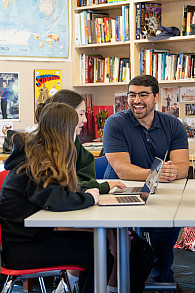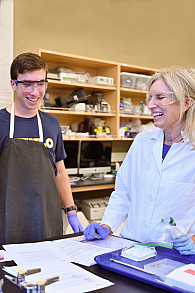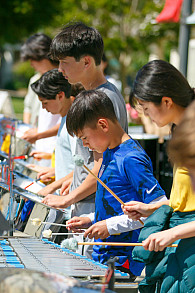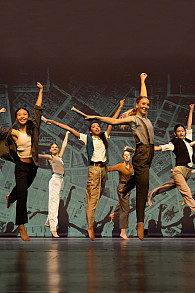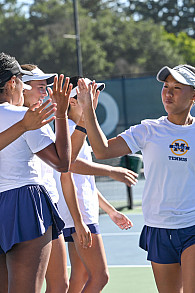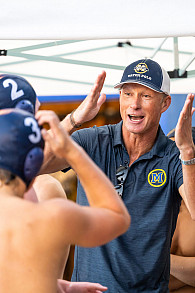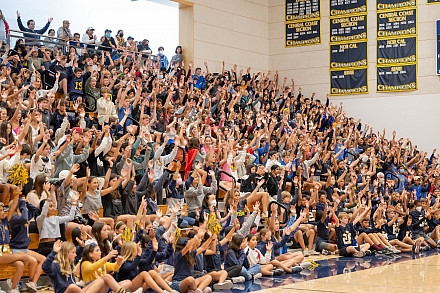- Arts
- Academics
-
Athletics
- Athletics Overview
-
Upper School Teams
- Baseball - Varsity
- Baseball - Junior Varsity
- Basketball - Boys Varsity
- Basketball - Boys Junior Varsity
- Basketball - Boys Freshman
- Basketball - Girls Varsity
- Basketball - Girls Junior Varsity
- Cross Country
- Flag Football - Girls
- Football - Varsity
- Football - Junior Varsity
- Golf - Girls Varsity
- Golf - Boys Varsity
- Golf - Boys Junior Varsity
- Lacrosse - Boys Varsity
- Lacrosse - Boys Junior Varsity
- Lacrosse - Girls Varsity
- Lacrosse - Girls Junior Varsity
- Soccer - Boys’ Varsity
- Soccer - Boys’ Junior Varsity
- Soccer - Girls Varsity
- Soccer - Girls Junior Varsity
- Swimming
- Tennis - Varsity Boys
- Tennis - Boys Junior Varsity
- Tennis - Girls Varsity
- Tennis - Girls Junior Varsity
- Track & Field
- Volleyball - Varsity
- Volleyball - Junior Varsity
- Volleyball - Freshman
- Water Polo - Boys Varsity
- Water Polo - Boys Junior Varsity
- Water Polo - Girls Varsity
- Water Polo - Girls Junior Varsity
-
Middle School Teams
- Baseball - Middle School
- Basketball - Boys Middle School
- Basketball - Girls Middle School
- Cross Country - Middle School
- Flag Football - Middle School
- Lacrosse - Boys Middle School
- Lacrosse - Girls Middle School
- Soccer - Boys Middle School
- Soccer - Girls Middle School
- Swimming - Middle School
- Tennis - Middle School
- Track - Middle School
- Volleyball - Middle School
- Athletics Philosophy & Values
- Athletics Resources
- Camps & Clinics
- Alumni Athletes
- New to Menlo Athletics?
- Student Life
- Support Menlo
- Admissions
- Calendar
- Resources
MENLO SCHOOL • SINCE 1915
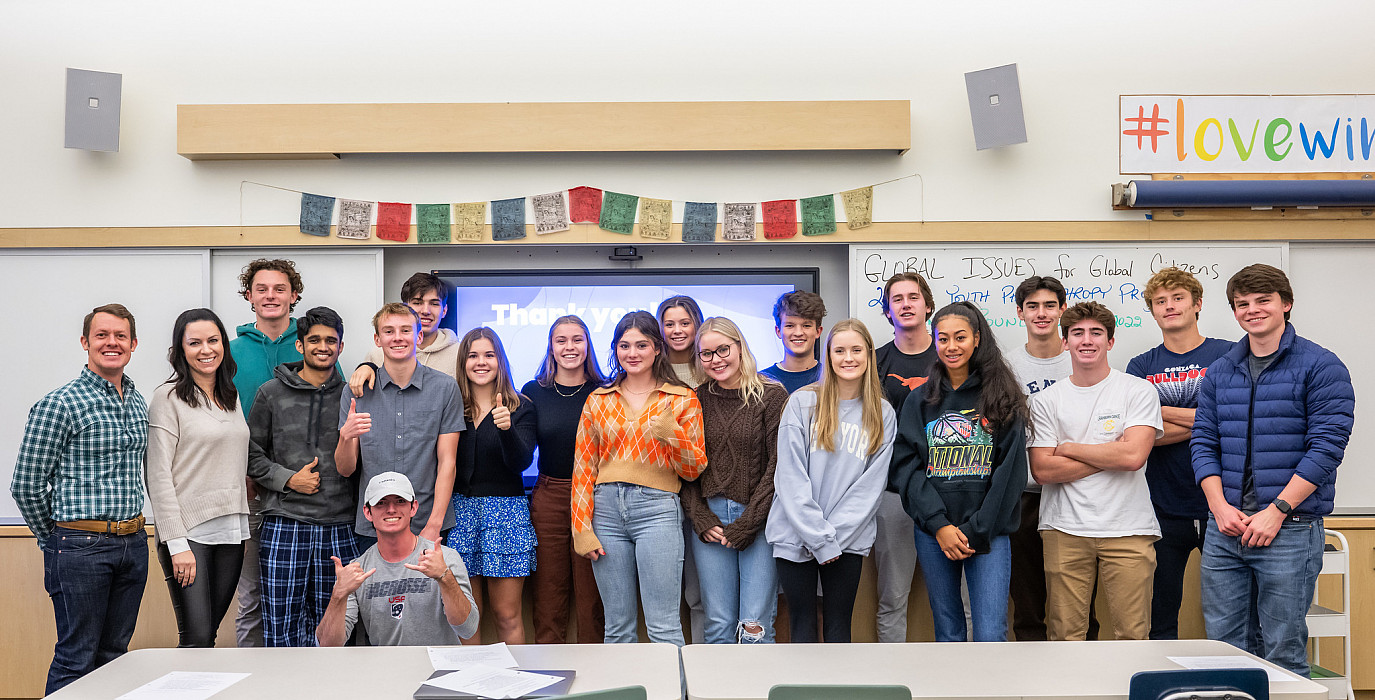
Global Studies
Youth Philanthropy Project
Menlo’s Global Issues for Global Citizens class annually partners with the HAND Foundation for Menlo’s Youth Philanthropy Project.
Through this semester-long History elective, students have the opportunity to learn about philanthropy’s role in addressing social issues around the world and make a direct impact. The project begins with students researching and selecting an NGO they feel is worthy of grant funds to support its efforts. Students aim to select organizations that do work outside of the United States and are addressing issues such as poverty, education, gender equality, health, and the environment. After selecting their NGO, the students prepare and gave a pitch presentation about their organization to explain why it is worthy of the grant. From those presentations, the class votes to narrow it down to several finalists.
History teacher Matthew Nelson, who leads the class, encourages students to think about the kind of impact they wanted to have and to listen to their heads as well as their hearts by exploring social issues that were in line with their interests and values. The students also needed to examine each organization critically, looking at their mission, overall impact, and sustainability, as well as investigating how they accomplish their mission and use their resources. Many of the students also reach out to the staff at the organizations directly to learn more about their programs and ask questions about their work and needs.
At the project’s culmination, the finalists pitch a lengthier ask to the class, which HAND Foundation cofounder Noosheen Hashemi annually attends to observe and decide how the grants—which in the past have ranged from $3,000 up to $8,000—should be allocated. Noosheen asks the students questions about the social impact of each organization and how they utilize resources and accomplish their missions. She also provided insights into philanthropy and nonprofit management and explains to the students her reasoning as to how much each NGO shall receive in grant money. The funds for the project are generously provided through the HAND Foundation’s Lend a HAND program, which promotes youth philanthropy and volunteerism.
“I enjoyed the youth philanthropy project because it gave me an integrative experience with the philanthropic world and opened my eyes to the amount of work that goes in to helping our communities,” says Emma Holland ’20. “It was the perfect culmination to a course that taught me how my views fit into the rest of the world.”
“I felt like this class was the best way to gain awareness on a range of [issues], mainly because of the Youth Philanthropy Project,” says Sydney Bianchi ’20. “I really appreciated that Mr. Nelson allowed us to deep dive into any issue of our choosing…I think this project is the most unique and significant way that Menlo students actually make a positive global impact.”
Past Grant Recipients
Brooke Hodge, $3,000 for the Panzi Foundation
“For this project, I wanted to focus on the Democratic Republic of Congo (DRC) because the conflict in the country is so severe and complex. As I began to research the Congo, I came across Dr. Denis Mukwege, a gynecologist that founded the Panzi Hospital in 1999. His stories of hope, perseverance, and strength inspired me throughout the entirety of compiling the case study. Through my research, I began to understand the issue of sexual violence in the DRC. The stories I read about in the DRC not only made me emotional, but they also caused me to want to contribute to a cause more than I ever had before.
“Due to the December presidential elections, political turmoil and mass rapes have rapidly increased in the Eastern DRC, the Panzi representative advised me that the funds would be of most benefit by going to a fund for a rapid response team that is accessing these mass rapes and giving survivors access to holistic healing. $1,020 could fund three doctors for a seven-day mission with protection kits; however, the $3,000 dollar grant can have a much larger impact, funding 10 doctors for seven days and three protection kits.”
The Youth Philanthropy Project in our Global Issues class is unlike any project I have taken part in at Menlo. It showed me how my learning can directly apply to the real world and how I can make an impact on the world even as a junior in high school. The research also allowed me to discover an issue that I am passionate about and will continue to advocate for. Along with making a relationship with a great NGO, this project helped me develop multiple skills including research, communication, and public speaking. I am extremely grateful to have taken part in this class and project and I am certain that the experience and lessons I learned in the class and during the project will help me throughout high school and college.
Emma Holland ’20, $2,000 for The Syrian Fund
“I chose this NGO because of the large-scale nature of the Syrian Refugee Crisis and because I believe the Syria Fund shows great promise in combating that issue. I admire the work ethic of the organization’s volunteers and appreciate that it helps Jordanian children in school and provides opportunities for refugee families to create a sense of normalcy after experiencing tremendous hardships. Though the organization is small in size, I believe it has the potential to influence greater change. As such, I believe this NGO deserves a chance to increase its impact and grow to support new programs.
“The grant will be used to continue construction on Campus B of the Azraq school in Jordan. This campus will be open for the majority of the day and can, therefore, be used by Jordanian and Syrian children. Additionally, the campus will include eight new permanent classrooms, an auditorium, a kitchen, an IT lab, a library, a sports field, and gardens. Many of these resources will also be made available for use outside of school activities.”
Ben Rubin ’20, $1,500 for Curamericas Global
“I chose the Curamericas NGO because it has a contagious passion to expedite the global fight against maternal and neonatal fatalities. This NGO works in the countries with the worst mortality rates in the world and prides themselves on how they confront this global issue head-on. Additionally, Curamericas has an evidence-based philosophy, and therefore a surplus of statistics which tangibly illustrate their impact in these countries. For instance, this NGO has provided sustainable healthcare to 1.4 million people worldwide, which amounts to about 24% of the annual deaths that they attempt to combat (this contains deaths in countries where Curamericas does not operate). Lastly, I was intending to go on a service trip with this non-profit over the summer and help construct another birthing center in Atitlan, Guatemala, but, sadly, a volcano eruption caused a travel cancellation. The Youth Philanthropy Project gave me another way to help this organization even though I didn’t get to go serve in person there last summer.
“The grant will go to the creation of more birthing centers in countries that are deprived of sufficient medical attention. Additionally, the money will go to the training and employment of locals in both Guatemala and Kenya and instructing them to promote better health standards, and gradually improve health normatives in local communities.”
Sydney Bianchi ’20, $1,500 for Invisible Children
“I chose Invisible Children because it aims to end the violence of the Lord’s Resistance Army, an armed rebel group in Uganda, South Sudan, the Democratic Republic of the Congo, and the Central African Republic. The crisis is incredibly pressing and brutal: the army rapes women, mutilates civilians by cutting off their lips, breasts, ears, and noses, pillages villages, kills thousands, and abducts children to fight in their army. It’s devastating and mostly ignored on an international scale. These countries lack efficient modes of communication to get the news of this crisis out to the world, so it’s quite an underserved issue overall, making me believe that this grant can really make a specific and impactful difference in the lives of these civilians.
“This money will be used to help victims of abduction of the LRA (forced soldiers) to come home. Invisible Children coordinates and funds flights, helps victims cross borders to get back home legally, and provides homestays where these victims can rest on their way. The major donor to this organization, the U.S. government, only funds their technological solutions such as radio networks. Thus, having funds available at any time in order to help these victims get back home is incredibly helpful.”
- Eva Herr – Femme International
- Katie Lambert – Mercy Project
- Jake Martin – Education for Employment
- Kelly Campa – Days for Girls International
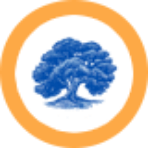 MENLO SCHOOL Since 1915
MENLO SCHOOL Since 1915